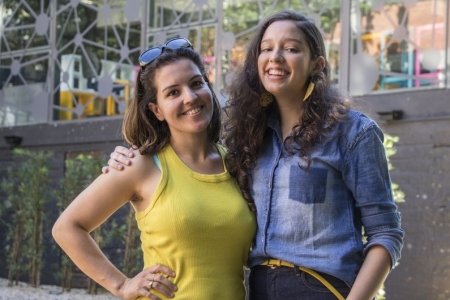26 Abril de 2018
Medical students attend event in India
Although 50% of the world's population live in rural areas, only 25% of physicians work in this region. It is by seeking to discuss precisely the specificities of this context that Univates Medical students Andressa Paz and Paola Veiga attend the 15th World Conference on Rural Health, which will be held from April 26 to 29 in New Delhi, India.
Members of the Rural Seeds network, the students make up the Brazilian delegation of the event. They exhibit the documentary "Francesa Alta", which presents Linha Alta, located in the city of Barão, Rio Grande do Sul. Having this rural area as a scenario, the documentary approaches the Brazilian public policies to guarantee access to health by the population and illustrates the role of a Family Health Strategy team in the care of rural patients, who deal, among other issues, with intoxication due to the use of pesticides. The documentary is inspired by the film "Island of Flowers", by Jorge Furtado.
At the conference, the students, in partnership with other participants of the event and with the Brazilian delegation, also give workshops, participate in panels and present posters and oral works, as listed below. The participation of the students in the event is being funded by themselves and by a collective financing: http://catarse.me/sauderuralindia.
Works with the participation of Univates students
WORKSHOP: Social media in rural health
Coordinator: Andressa Paz e Silva
Facilitators: Karine Kersting Puls, Ewen Mcphee and Zakiur Rahman
WORKSHOP: Rural Primary Healthcare: How can we attract students today and keep physicians tomorrow?
Coordinator: Karine Kersting Puls
Facilitators: Amber Wheatley, Paola Veiga, Shailey Prasad, Zakiur Rahman, Nishwa Azeem, Tarun Sen Gupta, Nataša Mrduljaš-Đujić and Ana Júlia Araújo de Carvalho.
WORKSHOP: Mentor Mentee program: balance after a pilot
Moderator: Mayara Floss
Panelists: Amber Wheatley, John Wynn Jones, Tarun Sen Gupta, Andressa Paz e Silva and Veronika Rasic
WORKSHOP: Are you prepared to breaking bad news?
Lead author: Karine Puls
Co-authors: Andressa Cavalcante Paz e Silva, Amber Wheatley and Tarun Sen Gupta
WORKSHOP: Rural Videos, how to produce it and how to foment information?
Moderator: Paola Iana Fucks da Veiga
Facilitators: Andressa Paz e Silva, Mayara Floss, Magda Almeida and Karine Kersting Puls
PANEL: Rural Seeds: what is it, what do we do and what is our future?
Moderator: Mayara Floss
Panelists: Amber Wheatley, Veronika Rasic, Andressa Cavalcante Paz e Silva and Paola Iana Fucks da Veiga
Poster: The importance of the League of Family and Community Health for the diffusion of rural in graduation, report of experience
Primary author: Paola Iana Fucks da Veiga
Co-authors: Carlos Adriano Caye, Andressa Cavalcante Paz e Silva, Mariana Weiand, Flavia Mafio Moro and Pedro Felipe Bohn Reckziegel
Oral communication:
Palliative and domiciliary rural care in Brazilian south
Main author: Ana Júlia de Araújo
Co-authors: Mayara Floss, Andressa Paz e Silva and Andréia Costa.
Short films:
Francesa Alta
Do you know what’s rural health?
Short-film Francesa Alta
Directed by: Paola Veiga
Subtitles in English: Andressa Paz
Editing and post-production: Maurício Hergemöller
Narrative: Lucas George Wendt
Collaboration: Tatiana Horscheid
Learn more about Rural Seeds
Rural Seeds is an international network that aims to promote rural health on three main fronts: education and training, empowerment, and communication. Formed mainly by students and young doctors, Rural Seeds defends the importance of training future health professionals in rural practice through mentoring and disseminating knowledge about the cause. In addition, it aims to improve the health of rural populations by seeking to understand what their greatest needs are in different countries and regions of the world.
